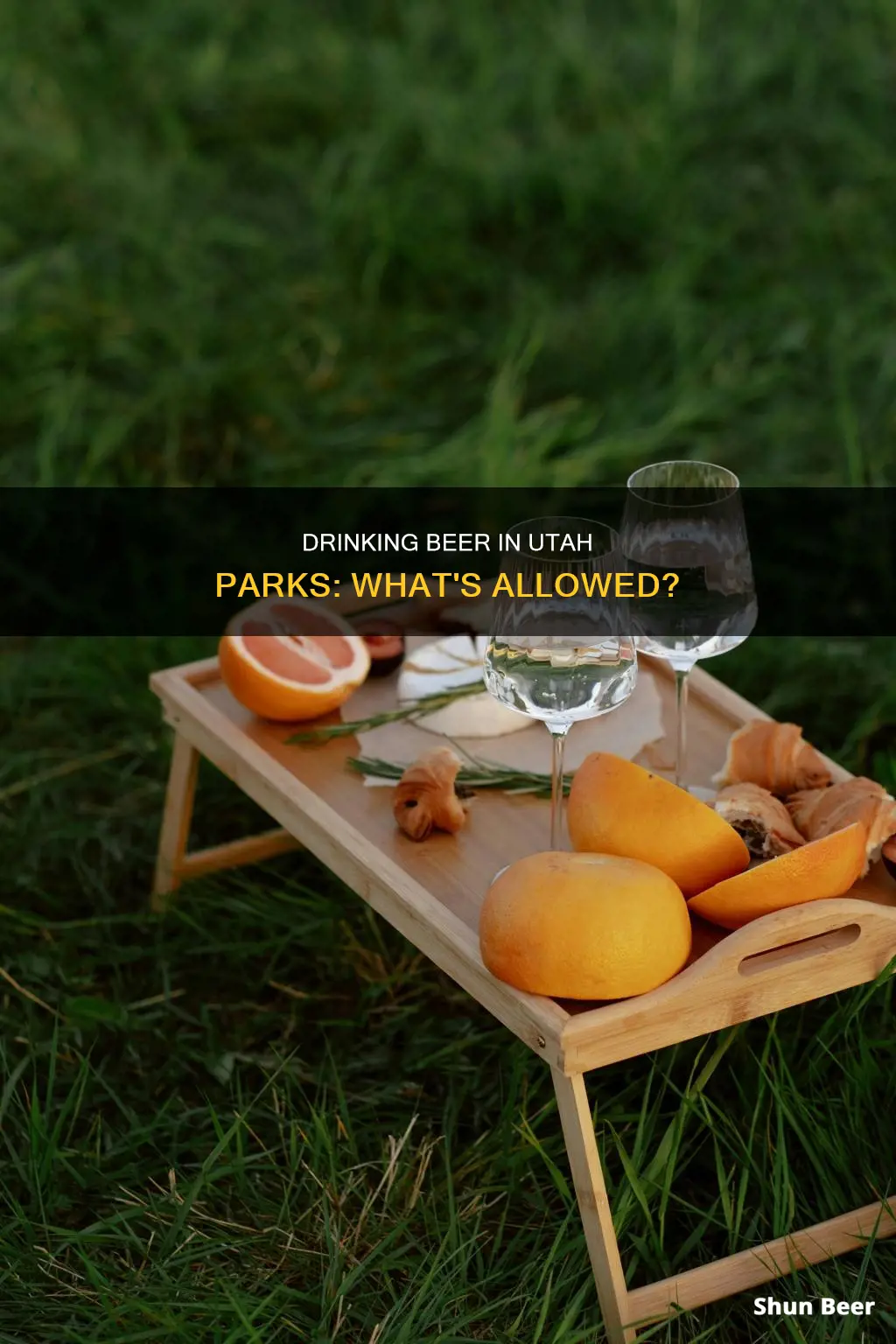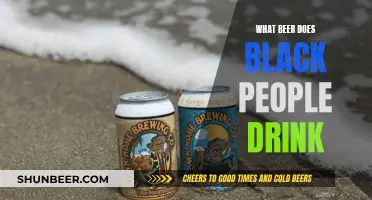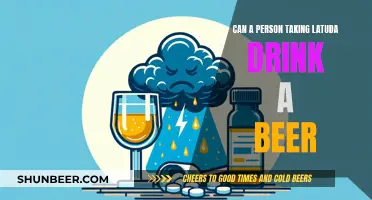
Drinking in public places is prohibited by Utah state law. However, there are many places where you can buy and consume alcohol in the state. Alcoholic beverages are available at licensed restaurants and bars seven days a week, and there are over 400 such places in Utah. Beer can also be purchased at establishments with a beer-only license, such as taverns, beer bars, and some restaurants. Beer over 5% ABV can be purchased at state liquor stores.
| Characteristics | Values |
|---|---|
| Can you drink beer at the park in Utah? | No, it is prohibited by state law to consume alcohol in public places. |
| Legal drinking age | 21 years old |
| Acceptable forms of ID | A valid U.S. driver's license, a passport, or a military identification card with a date of birth and a photo |
| ABV limit in beer sold at grocery and convenience stores | 5% |
| ABV limit in beer sold at state liquor stores | Higher than 5% |
| ABV limit in beer sold at breweries, wineries, and distilleries | Any |
| Hours during which alcohol may be served at bars and clubs | 10:00 a.m. – 1:00 a.m. |
| Hours during which alcohol may be served at taverns | 10:00 a.m. – 12:59 a.m. |
| Hours during which alcohol may be served at restaurants | 11:30 a.m. – 11:59 p.m. (weekdays), 10:30 a.m. – 11:59 p.m. (weekends) |
| Requirement to order food with alcoholic drinks at restaurants | Yes |
| Requirement to order food with alcoholic drinks at breweries and "beer-only" establishments | No |
| DUI/DWI limit | 0.05% BAC |
What You'll Learn
- Beer in Utah's parks is subject to the state's liquor laws, which include drinking age limits and ID requirements
- Alcoholic beverages above 5% ABV are sold in state-licensed liquor stores, while beer is available in grocery and convenience stores
- Utah's DUI limit is the strictest in the country at 0.05% BAC, so drinking in moderation is essential
- Alcohol consumption is prohibited in certain public places, including motor vehicles, and open containers are not allowed
- Park City, Utah, is located at a high altitude, which can intensify the effects of alcohol

Beer in Utah's parks is subject to the state's liquor laws, which include drinking age limits and ID requirements
Firstly, it is important to note that Utah has strict laws regarding the consumption of alcohol in public places. State law prohibits consuming liquor in public spaces, and it is illegal to be intoxicated in a public place, endangering oneself or others. Additionally, open containers of alcohol in vehicles are prohibited.
Utah's liquor laws require individuals to be at least 21 years old to purchase, possess, or consume alcoholic beverages. This includes beer, which is a popular choice for many park-goers. The legal drinking age is strictly enforced, and individuals under 21 are not permitted in establishments licensed as bars in Utah. This is an important consideration for families or groups with individuals under the legal drinking age.
When it comes to purchasing beer, Utah has specific regulations in place. Beer with an alcohol content of up to 5% ABV can be purchased at grocery stores, gas stations, arenas, festivals, and events. These locations typically offer a wide variety of craft beers from local breweries. However, for higher-ABV beers, one must visit state-licensed liquor stores or specific establishments licensed to sell liquor, such as clubs and certain restaurants.
The state of Utah also has unique requirements for restaurants and bars serving alcohol. In licensed restaurants, food must be ordered with alcoholic drinks, and it should be delivered by an authorized employee. This is a notable difference from bars, taverns, and beer-only establishments, where food is not required to be served with beer.
Furthermore, Utah has specific hours during which alcohol may be served. For bars, clubs, and taverns, alcohol can be served from 10:00 a.m. to 12:59 a.m., with a last call at 1:00 a.m. Restaurants have slightly different hours, serving alcohol from 11:30 a.m. to 11:59 p.m. on weekdays and 10:30 a.m. to 11:59 p.m. on weekends.
It is worth noting that Utah's liquor laws have evolved over time, becoming more modern and accessible to visitors. The state has moved away from the era of "private club memberships", making it easier for tourists to enjoy a drink. Additionally, the alcohol by volume percentage in beer has increased from 4% to 5%, providing a wider variety of options in local stores.
In conclusion, when drinking beer in Utah's parks, it is essential to abide by the state's liquor laws, which include drinking age limits of 21 and over, strict ID requirements, specific purchasing regulations, and designated hours for alcohol service. These laws are in place to ensure the responsible consumption of alcohol and may differ from other states' regulations.
The Chemistry of Beer: How It Works and Why It Matters
You may want to see also

Alcoholic beverages above 5% ABV are sold in state-licensed liquor stores, while beer is available in grocery and convenience stores
Drinking laws in Utah have been updated in recent years to modernise their approach. One notable change is that private club memberships are no longer required to enter bars.
In Utah, beer, liquor and wine can be ordered in a restaurant from 11:30 a.m. to 1 a.m., but as the establishment is licensed as a restaurant, these drinks must be ordered with food. A bar, tavern, brewery or nightclub, on the other hand, can sell alcohol during the same hours as a restaurant, but food is not required.
Beer with 5% alcohol by volume (ABV) can be purchased almost anywhere, including grocery stores, gas stations, arenas, festivals and events. Beer sold in grocery stores and on tap in restaurants and bars is 3.2% ABV, but there is a wide variety of full-strength beer produced by breweries and sold in cans and bottles in liquor stores and many restaurants and bars. Stronger beer, above 5% ABV and up to 13% ABV, is sold in select bars and restaurants and at state-owned liquor stores.
Liquor and wine are sold exclusively at state-run liquor stores, which are closed on Sundays and holidays and often close as early as 7 p.m. State liquor stores accept cash, cheques and credit cards.
Buttermilk Beer Batter: Does Druesteaz Mix Work?
You may want to see also

Utah's DUI limit is the strictest in the country at 0.05% BAC, so drinking in moderation is essential
Utah has strict liquor laws that can be challenging for tourists to navigate. While drinking in public parks is not addressed, it is illegal to have an open container of alcohol in your car, even if you are not driving. In addition, drinking in public places, such as on the sidewalk or in a parking lot, is prohibited. However, there are over 400 places where you can enjoy a drink in Utah, including bars, pubs, restaurants, and breweries.
When drinking in Utah, it is essential to be aware of the state's unique liquor laws. One notable difference is between bars and restaurants. Beer, liquor, and wine can be ordered in a restaurant from 11:30 a.m. to 1:00 a.m., but these drinks must be accompanied by food. On the other hand, taverns, breweries, and bars are allowed to sell alcohol during the same hours as restaurants without requiring patrons to order food.
Another important consideration is the type of alcohol available. While you can find 5% alcohol by volume beer practically everywhere, including grocery stores, gas stations, arenas, festivals, and events, stronger beers are only sold in select bars, restaurants, and state-owned liquor stores. Liquor and wine are exclusively sold at state liquor stores and are not available in grocery stores.
Utah's DUI limit is the strictest in the country, with a blood alcohol concentration (BAC) limit of 0.05%, lower than the more common limit of 0.08% in most other states. This lower limit means that it takes fewer drinks to exceed the BAC limit in Utah. For commercial drivers, the limit is even lower at 0.04%. As a result, drinking in moderation is essential to stay within the legal limit and avoid a DUI charge.
The strict DUI laws in Utah have had a positive impact on road safety. After the lower BAC limit was enacted, Utah recorded a 19.8% reduction in fatal car crashes and an 18.3% reduction in fatalities from 2016 to 2019. This data highlights the effectiveness of Utah's stringent DUI laws in saving lives and reducing drunk driving incidents.
Charleston Beer Works: Closest Hotels for a Quick Pint
You may want to see also

Alcohol consumption is prohibited in certain public places, including motor vehicles, and open containers are not allowed
Alcohol laws in Utah are some of the most restrictive in the United States. While alcohol is available in the state, there are many regulations around its consumption. One notable restriction is that alcohol consumption is prohibited in certain public places, including motor vehicles, and open containers are not allowed.
Utah has strict rules about where alcohol can and cannot be consumed. While drinking in public places is generally prohibited, there are some exceptions. For example, alcohol can be consumed at public or community events that have been permitted by the state to sell and serve alcoholic beverages. Additionally, Utah allows for the consumption of alcohol in designated areas within national parks, such as Springdale near Zion or Moab near Arches and Canyonlands. However, it is important to note that rules around alcohol consumption vary from park to park, so visitors should familiarise themselves with the regulations of each park before consuming alcohol.
The state also has regulations regarding the sale of alcohol. Establishments are classified as either restaurants, bars, or clubs, and each has its own set of rules. For instance, at restaurants, alcoholic drinks can only be served with food, but at breweries or any beer-only establishments, food is not required to order a beer. Furthermore, Utah has strict laws regarding the service of alcohol to minors, and anyone under the age of 21 is prohibited from entering bars or lounges, even if they are accompanied by an adult.
Another unique aspect of Utah's liquor laws is the difference between a bar and a restaurant. Beer, liquor, and wine can be ordered in a restaurant from 11:30 a.m. to 1:00 a.m., but since the establishment is licensed as a restaurant, these drinks must be accompanied by food. On the other hand, taverns, breweries, and bars are allowed to sell alcohol during the same hours as restaurants without requiring patrons to order food. This distinction has led to some eateries choosing to license themselves as bars to accommodate those who want to drink without eating.
In conclusion, while Utah has made strides to modernise its liquor laws, alcohol consumption and purchase are still highly regulated. The state's unique cultural and religious background has influenced the development of these laws, and they continue to evolve to balance the needs of tourists, businesses, and residents.
Beer Distribution in Pennsylvania: A Unique System
You may want to see also

Park City, Utah, is located at a high altitude, which can intensify the effects of alcohol
Park City, Utah, is located at a high altitude, with an elevation of around 7,000 feet above sea level. This is notably higher than Salt Lake City, which sits at about 4,300 feet. Park City's altitude is one of the reasons the area offers such stunning views and incredible opportunities for outdoor recreation. However, it's important to be aware that this high altitude can intensify the effects of alcohol.
The impact of alcohol is felt more quickly at higher altitudes. Park City's Main Street, at 7,000 feet above sea level, is a prime example of this phenomenon. Visitors often comment that they feel the effects of alcohol more rapidly than they would at lower elevations. This is a well-known phenomenon in high-altitude locations, and it's worth exercising caution when consuming alcohol in Park City.
Altitude sickness is a common issue for visitors to high-altitude locations like Park City. The initial symptoms of altitude sickness typically appear around 6,000 feet above sea level, and the higher you go, the more severe the symptoms can become. This is particularly true if you are stressed, tired, or dehydrated when you arrive. Those coming from sea level are especially vulnerable to the effects of altitude sickness.
To prevent altitude sickness in Park City, it is recommended to stay well-hydrated, gradually ease into activities, maintain healthy blood sugar levels with light calories, and allow yourself a rest day upon arrival. It is also advisable to avoid excessive alcohol consumption, especially during your first days at high altitude, as it can exacerbate the symptoms of altitude sickness.
The high elevation of Park City can also accentuate any existing health problems, particularly vascular or respiratory issues. If you have any concerns, it is important to consult with your physician before travelling to Park City. Remember to listen to your body and adjust your activities as needed to ensure a safe and enjoyable experience at this high-altitude location.
Beer and Nissen Fundoplication: What You Need to Know
You may want to see also
Frequently asked questions
No. State law prohibits consuming liquor in public places.
You must be 21 or older to buy or consume alcohol in Utah.
Beer with 5% ABV (4% alcohol by weight) can be purchased in grocery and convenience stores. Beer with higher ABV is available in state liquor stores.
Yes, always carry a valid ID when heading to a bar in Utah. Acceptable forms of ID include a valid US driver's license, a passport, or a military identification card with a photo and date of birth.







